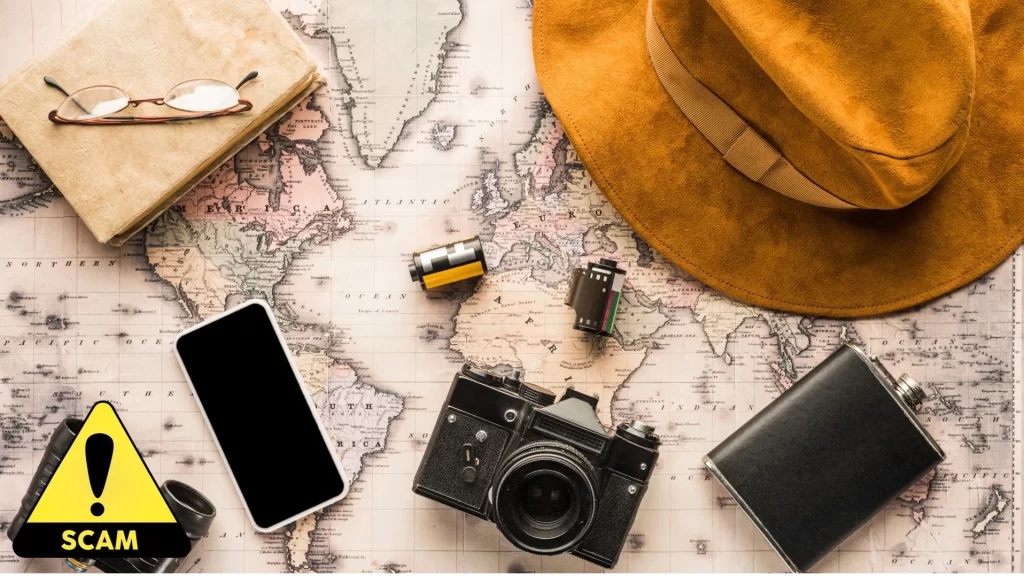Travel Scams are plans or false exercises that target travelers especially when travelers are searching for cheapest places to go on holiday and best countries to travel with kids, This frequently points to misuse of their need of recognition with a specific goal or their want for a hassle-free travel encounter. These travel scams can happen both online and offline, and it’s critical for travelers to be mindful of this travel scams in order to ensure themselves. Here are a few common travel scams you ought to be cautious of:
LIST OF TRAVEL SCAMS
1. Online booking scam:

False websites or online travel operators may offer alluring bargains on flights, lodgings, or get-away bundles to bait clueless travelers. They may either vanish after getting installment or give substandard administrations that do not coordinate the promoted advertising. Continuously inquire about and utilize trustworthy, well-known travel websites or book specifically with trusted carriers and lodgings, this is one the well know method of travel scams.
2. Fake accommodation:
This travel scams works this way, scammers make invented housing postings on well known online stages. They may utilize stolen photographs, fake surveys, and luring costs to trap travelers into making reservations and paying in development. To maintain a strategic distance from this, studied audits from numerous sources, confirmed the authenticity of the property, and considered booking through trustworthy websites or specifically with the lodging.
3. Taxi scams:
Corrupt taxi drivers may cheat sightseers by taking longer courses, altering with meters, or claiming their meter is broken. It’s prudent to utilize authorized taxis or ride-hailing administrations when accessible, concur on an admission in development, and be mindful of the normal rates within the zone, indeed this travel scams method is used globally.
4. Road scams:
These tricks can shift broadly depending on the goal. Common cases incorporate people posturing as inviting local people or “authorities” who offer help, as it were to pickpocket or divert you whereas an accessory takes your assets. Be cautious of outsiders drawing nearer you, particularly in swarmed visitor regions, and keep your resources secure.
5. Money trade scams:
Unscrupulous money trade workplaces may offer unfavorable rates, charge tall expenses, or utilize sleight of hand to deliver you less cash than you’re entitled to. It’s best to trade cash at trustworthy banks or authorized trade centers, and continuously number your cash some time recently clearing out the counter.
6. Wi-Fi and information scams:

Open Wi-Fi systems can be uncertain, and scammers may set up fake systems with names comparable to true blue ones to take individual data. Dodge getting to touchy accounts or making monetary exchanges on open Wi-Fi. Instep, utilize a secure VPN or depend on your portable information arrange.
Having get to to open Wi-Fi is ordinarily a alleviation to travelers looking to induce online. Be that as it may, this free benefit can some of the time give brilliant openings for offenders. Open places make a incredible cover for programmers who can effortlessly set up noxious hotspots and take individual information.
Destitute switch arrangement and need of a solid watchword can make open Wi-Fi hotspots helpless. Programmers can work unnoticed utilizing fundamental, user-friendly computer program which is accessible legitimately, such are Wireshark and Aircrack-ng. It may be a speedy handle to see private data sent from a gadget associated to an unsecure Wi-Fi, counting passwords and credit card points of interest. Most noticeably awful of all, the casualty of the wrongdoing frequently will not take note that their contraption has been seized.
7. Timeshare scams:
A few goals have a predominance of timeshare tricks, where sales representatives utilize high-pressure strategies to persuade travelers to buy get-away proprietorship or timeshare properties. Be doubtful of spontaneous offers, studied contracts altogether, and take time to consider the choice some time recently marking anything.
8. Train Stations:
One of the foremost common travel scams is the “bump and get,” and as often as possible happens in prepare, transport, and metro stations. Visitors can effortlessly get diverted and overpowered by the number of individuals in these bustling transportation center points. In this trick, a cheat or a gather of hoodlums will “accidentally” bump into a traveler. Whereas you’re occupied, the scammer is picking your take.
When on trains, cheats regularly remain close the prepare entryway timing their following move. Fair as the entryway is set to closed, they swipe satchels and other possessions and make a fast getaway whereas the prepare takes off the station.
9. Tuk – Tuk Tours:

One of the foremost agreeable ways to urge around touristy regions in Southeast Asian Nations like Thailand is to go for a ride in a tuk-tuk. Travelers are prompted to be attentive of tuk-tuk drivers advertising free or cheap day visits. You might get the chance to see sanctuaries or points of interest, but along the trip, the driver will likely bring you to neighborhood shops that offer them a commission. Comparative to the feared timeshare pitch, you’ll be subjected to a long-winded deals pitch by the shop proprietor on their goods and administrations.
10. Jet Ski Rentals:
Travelers picking to lease a vehicle ought to be cautious. It is common for shop attendants to hold your visa as collateral whereas you’re out on your trip. After you return the bike or fly ski at the end of the day, the proprietor claims merely caused damage to the hardware and will ought to pay for repair charges. Travelers on edge to urge their international id back may pay the expense.
Make beyond any doubt to do a exhaustive inspection of the vehicle some time recently you fly off. On the off chance that conceivable, let the shop guardian know you’re taking pictures or a video of existing harm, and attempt to incorporate them within the film. This will ideally avoid a your-word-against-theirs contention afterward.
Next well be covering another aspect of travel scams travelers might face all in the process of connecting with people or individuals
One of the foremost fulfilling parts of travel is all of the modern associations you make, but be cautious of covert thought processes in case you take note any of the taking after ruddy banners.
Neighborly Neighborhood

Male travelers may discover themselves drawn closer by pleasant, flirty, local people out at bars or eateries. They may insist on showing you the most excellent spots around town. Travelers make a fast companion over the course of a few rounds of drinks or a multi-course feast. When it’s time to settle the tab, the unused nearby companion is no place to be found. Or, more awful, an excessively trusting visitor may be sedated and wake up to discover they have been victimized.
In the event that somebody you fair met is advertising to appear you around or is being unusually forward with you, consider it a ruddy hail. On the off chance that you are doing wish to seize a drink with a unused companion, go to a area of your choosing, and don’t drink to a point where your bar tab will stun you.
Spilled drinks:
Travelers may be minding their own business, and suddenly they find themselves splattered by a drink or condiment. A friendly stranger will profusely apologize and insist on trying to clean up the mess. While dabbing the stain, the thief can swipe the wallet of the disoriented tourist.
Police Officer Impersonators
The fake police officer trick is predominant in numerous huge cities. Visitors frequently do not know the traditions and are willing to comply with hoodlums in uniform. The fake officers may clarify that there has been a issue with fake bills circulating within the zone, or attempt to ticket you for a made-up violation. The officers will then demand that you simply hand over your international id and wallet.
Never deliver anybody your individual possessions. Ask to see appropriate recognizable proof, and demand on dealing with this matter at the neighborhood police station.
Accidents happen, but travelers should assume that any commotion like this is designed to be a distraction. Don’t let anyone in your personal space and find a restroom to clean yourself up.
Juice jacking:
As travelers, we are subordinate upon our portable gadgets for nearly everything – communication, data, excitement – the list goes on. But our gadgets depend on a control source and travelers are frequently scrambling to plug in at whatever point the feared moo battery is demonstrated. But do not plug into that open charging station fair however – “juice jacking” may be a unused concern for travelers to be mindful of.
Juice jacking happens when a criminal alters with a USB charging harbour, or the cable joined to it, so that it introduces malware on a gadget that’s stopped into it. This malware may bolt the gadget or send information, passwords, or indeed a full reinforcement of the phone directly to the scammer.
As of 2019, as it were a number of cases have been detailed, all happening on the east coast. Be that as it may, the innovation has been demonstrated and juice jacking may gotten to be a greater issue within the future.
To be on the secure side, it is suggested to plug specifically into an AC power outlet rather than a charging station, and to require your cables with you. Outside batteries are too extraordinary choices, additionally permit the client to wander free instead of be fastened to the control station whereas their phone charges.
Free Friendship Bracelet:
Especially common in major marketplaces and touristy zones over Europe, sellers target sightseers (especially ladies) to strike up a discussion or indeed forcefully inquire for offer assistance with a show. The merchant at that point continues to rapidly braid a fellowship bracelet on you, hand you a sprig of rosemary, or decorate you with pieces of jewelry. Some time recently you’ve got a chance to expel and deliver back the thing, the merchant will uproariously request a strong premium for the thing. Courteous visitors frequently need to maintain a strategic distance from causing a scene and feel obliged to pay.
Do not let anybody put anything on you. This will not as it were offer assistance dodge the bother of managing with a pushy seller, but this interaction may be a set up for burglary. In the event that you’re distracted with the merchant, their accomplice has time to remove items form you without you noticing
Found ring:
This plot begins with somebody stopping you with a ring, inquiring in the event that you’ve got fair dropped the thing. After assist examination, they take note that the ring is important and offers to offer it to you for a moo cost. You’ll exchange the thing afterward for way more than you got it for, a apparently win-win bargain. Once you at last evaluate the adornments, it is demonstrated to be a fake!
Additionally to the bracelet trick, sightseers are exhorted to keep your head down and keep on strolling in the event that you suspect that something isn’t right.
Wrong change
For those wary of identity theft or having their credit cards compromised, paying with cash may seem like a safe option. But even cash payments will have their challenges. Be careful breaking large bills on small tabs, especially in countries where all of the currency looks similar. It is common for scam artists to sneak in some lesser value bills.
If you do need to use a large bill, make sure you say out loud how much you have paid, so it is clear you are expecting change back. Even if your cashier says the correct amount of change, they may be trying to pull a fast one on you. Travelers should familiarize themselves with the currency used at their destination, and always count their change.
Traveler voucher fraud
Whereas travel vouchers are a extraordinary choice for travelers whose plans were suddenly canceled, this modern ordinary is additionally demonstrating to be a prevalent choice for scammers and offenders to require advantage of.
Working out skepticism is one of the foremost capable devices travelers have for the assurance of their vouchers. Anything that appears unordinary, amateurish, or as well great to be genuine likely is a scam, and when in question continuously contact your travel supplier directly.
Utilize caution when sharing touchy voucher data and watch out not to share it with an unsubstantiated source. In case you would like to contact your travel provider with a address or ask with respect to your voucher, be beyond any doubt you know who you’re calling. Scammers have been detailed to form fake online locales or postings for a travel provider, directing clients to contact this fake phone number or mail address specifically. On the off chance that a casualty gives their private voucher and contact data, the criminal can take the data they have collected verbally and deplete the voucher of its esteem.
In the event that obtaining a modern voucher, travelers are once more prompted to stay careful – pay consideration to the points of interest of the wording, investigate the notoriety of the company offering it, and perused the fine print. Syntactic blunders are a ruddy flag in official records like a voucher. In the event that obtaining online, the unimportant presence of a symbol does not cruel that the trade is an authorized affiliate of travel items and ought to continuously be confirmed some time recently acquiring.
Be careful of any bargains that appear as well great to be genuine. One detailed trick includes offenders obtaining vouchers utilizing stolen credit cards and rapidly exchanging them. Once the travel provider catches on and cancels the exchange, the casualty who obtained the voucher is left with a useless paper. Employing a credit card, as contradicted to a debit card, could be a awesome way to ensure yourself from this as credit cards frequently offer upgraded security and extortion assurance.
Travel insurance scams
Most travel insurance tricks happen when booking flights and travels or when reserving hotel rooms. Customers are forced into checking a box to purchase a low-cost protections arrange to secure their trip. Travelers expect that they paid for trip security benefits but regularly get small to no scope for common travel issues.
Our best exhortation:
do not check the box. Each trip is special and comparing plans to discover the scope that best suits your agenda is vital.
Insure My Trip prides itself on being open and fair with travelers. Our award-winning agents work with you to investigate and compare your protections alternatives. They don’t work on commission and won’t offer you a arrange you do not need. Their expertise may be a free asset for travelers looking to guaranteed their trip. All of our agents are authorized travel protections operators, so they know the in’s and out’s of each arrangement on our location.
To protect yourself from travel scams, it’s important to research your destination, stay informed about common scams in the area, use reputable service providers, and exercise caution when sharing personal or financial information. If you encounter a scam or suspicious activity during your travels, report it to local authorities and your embassy or consulate if necessary
Whereas travel tricks can happen in different parts of the world, it’s critical to note that they are not elite to particular nations. Scammers can work anyplace visitors are show. In any case, certain goals may have a better frequency of travel tricks due to components such as tall traveler activity, financial conditions, and a need of effective law authorization. Here are many nations that have been known to have higher recorded rates of travel Scams:
NATION WITH HIGH RATE OF TRAVEL SCAMS:
Thailand:

As a popular tourist destination, Thailand has seen instances of scams targeting visitors, including tuk-tuk scams, gem scams, and jet ski scams. Tourists are advised to be cautious and use reputable services.
Tuk-tuk Overcharging: Tuk-tuks are a popular mode of transportation in Thailand, but some drivers may try to overcharge unsuspecting tourists. They might quote exorbitant prices or take longer routes to increase the fare. Always negotiate and agree on the fare before starting the ride, or consider using metered taxis instead.
Gem Scams: Be cautious when approached by individuals offering incredible deals on gemstones or jewelry. Scammers may claim to have insider connections or limited-time discounts, but in reality, they often sell low-quality or fake products at inflated prices. Purchase gems and jewelry from reputable shops with certifications.
Grand Palace Scam: When visiting the Grand Palace in Bangkok, scammers might approach you and claim that the palace is closed for various reasons, such as a special ceremony or holiday. They’ll then offer to take you to other attractions or shops instead. Always check the official opening hours and ignore such solicitations.
Fake Travel Agencies: Exercise caution when booking tours, transportation, or accommodations through small, unknown travel agencies. Some may advertise attractive packages but fail to deliver on their promises or disappear altogether. Use well-established and reputable travel agencies or book directly through trusted online platforms.
Street Vendors and Fake Goods: Thailand is known for its bustling street markets, but be wary of counterfeit goods being sold. From designer clothing and accessories to electronics, scammers may try to pass off fake products as genuine. Purchase from reputable stores or authorized retailers to avoid being deceived.
Remember, staying informed and exercising caution can help you avoid falling victim to travel scams in Thailand or any other destination. Research, rely on trusted sources, and trust your instincts when something seems too good to be true
ITALY

Scams targeting tourists are prevalent in major tourist cities like Rome, Florence, and Venice. Examples include fake gladiators, unauthorized street vendors, and pickpocketing in crowded areas. Visitors should be vigilant, keep valuables secure, and avoid engaging with suspicious individuals.
Restaurant Scams:
Be cautious of restaurants in touristy areas that may overcharge or add hidden fees to your bill. Look for menus with clear prices, ask for recommendations from locals or trusted sources, and consider exploring restaurants in less crowded areas for an authentic dining experience.
Fake Tickets and Guided Tours:
Be wary of individuals selling counterfeit tickets to popular attractions or offering unauthorized guided tours. Purchase tickets from official sources, such as the attraction’s website or authorized vendors. If hiring a guide, ensure they have proper credentials and operate through reputable agencies.
Pickpocketing and Bag Snatching:
Like in any popular tourist destination, petty theft can occur in crowded areas. Stay vigilant in busy places like train stations, markets, and popular tourist sites. Keep your belongings secure, use anti-theft bags, and avoid displaying valuable items openly.
Fake Designer Goods:
Italy is renowned for its fashion, making it a prime location for counterfeit products. Exercise caution when purchasing luxury brands at street markets or from unauthorized sellers. Stick to reputable stores or authorized retailers to ensure authenticity.
Unofficial Tourist Guides:
Be cautious of self-proclaimed tour guides who approach you outside major attractions. Official guides wear badges and are licensed by the local tourism authorities. Hiring unauthorized guides may lead to poor experiences or potential scams.
Spain

Barcelona and Madrid, in particular, have reported instances of pickpocketing, bag snatching, and scams involving street performers or distraction techniques. Travelers should be mindful of their belongings and avoid carrying large amounts of cash or valuables.
The “Distraction” or “Flower” Scam: Scammers may approach you on the streets, attempting to distract you by offering a rose or engaging in friendly conversation. While you’re distracted, an accomplice may attempt to pickpocket or steal your belongings. Stay alert, keep your valuables secure, and politely decline any unsolicited offers.
Pickpocketing: Barcelona and Madrid, like many popular tourist destinations, have incidents of pickpocketing, especially in crowded areas and public transportation. Keep a close eye on your belongings, use anti-theft bags or money belts, and avoid displaying valuable items openly.
Fake Police Officers: Scammers posing as police officers may approach you, claiming to investigate counterfeit money or other issues. They may ask to see your identification or wallet. Be cautious and insist on verifying their identity by asking for official identification or call the local police to confirm their legitimacy.
Fake Ticket Sellers: Be cautious when purchasing tickets to popular attractions, especially from street vendors. Scammers may sell counterfeit or invalid tickets. Purchase tickets from official sources, such as authorized vendors or the attraction’s official website.
Fake Petition Signature Scam: Scammers may approach you with a petition to sign for a charitable cause or to support a local initiative. While you’re focused on the petition, they may attempt to pickpocket or steal your belongings. Exercise caution and avoid engaging with such individuals
The next on our list is Morocco
MOROCCO

While Morocco is a beautiful destination, travelers should be aware of scams targeting tourists, such as unofficial tour guides, counterfeit goods, and taxi drivers who overcharge or take longer routes. It’s advisable to use licensed tour guides and agree on prices before getting into a taxi.
it’s important to be aware of potential scams. Here are some common scams to watch out for:
Faux Guides: Beware of individuals posing as tour guides near popular tourist attractions, especially in cities like Marrakech and Fes. These unauthorized guides may offer their services and lead you to shops where they receive commissions. To ensure a legitimate guide, rely on official tourist offices or reputable tour agencies.
Medina Touts: In the bustling medinas (old towns), you may encounter persistent touts who try to lead you to shops or restaurants where they have arrangements. They might claim that your intended destination is closed or offer to guide you for a fee. Politely decline and rely on your own research or seek recommendations from trusted sources.
Henna Scam: Beware of henna artists, especially in touristy areas. Some artists may approach you and start applying henna without clearly discussing the price. After the design is done, they might demand an exorbitant fee. Clarify the price beforehand, or better yet, visit reputable henna studios.
Carpet and Craft Scams: When shopping for carpets, textiles, or crafts, exercise caution. Some sellers may inflate prices or sell inferior quality items. Take your time, compare prices, and visit established shops or cooperatives recommended by locals or reputable guidebooks.
Currency Exchange Scams: Be cautious when exchanging currency. Some unofficial money changers may offer favorable rates but cheat tourists by shortchanging or using sleight of hand techniques. Use reputable exchange offices or banks, and count your money carefully.
Remember, these scams are not exclusive to Morocco, and they can occur in many tourist destinations. Stay vigilant, trust your instincts, and rely on trusted sources for information and services. With awareness and preparedness, you can have a memorable and safe experience exploring the beautiful country of Morocco.
NIGERIA

like numerous other nations, does have detailed episodes of travel tricks. Whereas it’s imperative to note that travel tricks can happen anyplace, certain goals may have a better rate based on different components.
In Nigeria, travelers have detailed tricks such as progress expense extortion (commonly known as “419 tricks”), where people may attempt to misdirect sightseers into giving cash or individual data with guarantees of money related pick up. These tricks regularly happen through e-mail or online communication.
Furthermore, there have been reports of tricks including fake visit guides, false convenience bookings, and taxi drivers who cheat or take longer courses.
More tips on how this scam occurs we will discuss shortly
Progress expense extortion:
This scam ordinarily includes somebody promising you a profitable bargain, such as an venture opportunity or an legacy, but they require an forthright installment or individual data to prepare the exchange. Be watchful of any spontaneous offers and maintain a strategic distance from sharing delicate points of interest or making installments without confirming the authenticity of the offer.
Airplane terminal tricks: Be cautious of people posturing as airplane terminal authorities or taxi drivers advertising help with transportation or things dealing with. Adhere to authorized taxi administrations and maintain a strategic distance from tolerating spontaneous offer assistance from outsiders. nsure that the taxi encompasses a working meter or concur on a cost some time recently beginning the travel.
Money-related tricks: Fake cash can be an issue in Nigeria. Familiarize yourself with the neighborhood cash and be cautious when accepting alter or utilizing expansive bills. Confirm the realness of cash with trustworthy foundations or banks.
Road scams:
Pickpocketing and sack grabbing can happen in swarmed regions, so stay careful, particularly in markets, open transportation, or traveler hotspots. Be cautious of outsiders who approach you too much neighborly or offer spontaneous offer assistance. Keep your assets secure and maintain a strategic distance from showing important things.
To secure yourself from travel tricks, it’s fitting to remain educated, work out caution, and utilize common sense. Inquire about your goal, be mindful of common tricks, and believe your instinctual. It’s continuously a great thought allude to”>to allude to official travel advisories and look for suggestions from trusted sources some time recently your trip to Nigeria or any other nation.



